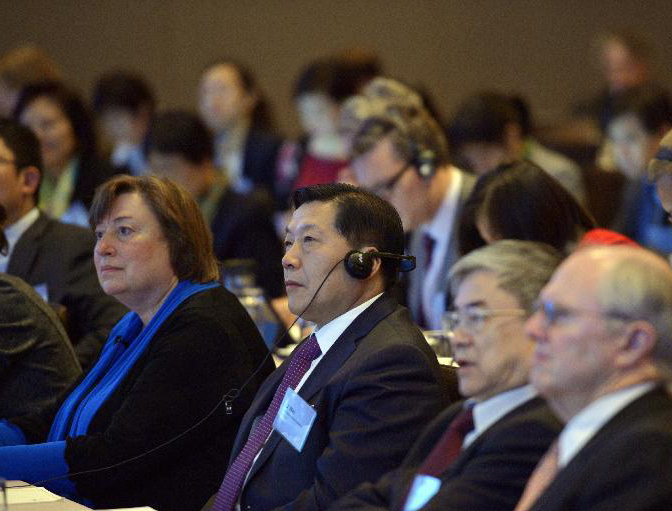Think tanks look ahead to summit between Xi, Obama

Minister Lu Wei of China’s State Internet Information Office and Catherine Novelli, US under secretary of state for economic affairs attend the seventh China-US Internet Industry Forum in Washington. Internet security can become a new area for cooperation between the two countries despite disagreements in this respect, attendees said.
Chinese President Xi Jinping will make his first state visit to the US in September. The meeting between the leaders of the world’s two largest economies has become the focus of think tanks in both nations.
A number of major US think tanks, including the Council on Foreign Relations and the Brookings Institution, expressed their intent to invite Xi to speak.
Think tanks have identified economic and trade relations as well as Internet security as the major topics of the summit.
The summit will create new opportunities for economic and trade exchanges between the two sides, representatives of think tanks said. In the past 30 years, economic and trade exchanges between China and the US have been a boon to China’s economic development, said Zheng Xinli, executive vice-chairman of the China Center for International Economic Exchanges. However, in light of changes within these two countries as well as relations between them, adjustments should be made to former cooperative modes, and new platforms are required.
Zheng pointed out that the September summit intends to make progress on three agreements—the Bilateral Investment Treaty, the Bilateral Investment and Trade Treaty and a bilateral free trade agreement.
Based on these discussions the two sides will negotiate the possibility that China could introduce the US to the Regional Comprehensive Economic Partnership in exchange for the US helping China join the Trans-Pacific Partnership. All these opportunities would draw the two countries closer and realize mutual prosperity.
President Su Ge of the China Institute of International Studies claimed that Chinese initiatives like the Asian Infrastructure Investment Bank, the community of common destiny and the “One Belt, One Road” strategy all aim at optimizing the existing political and economic order, with no intention of exclusiveness. In return, China hopes America’s TPP could be more inclusive.
David Dollar, senior fellow with the Foreign Policy and Global Economy and Development programs at the Brookings Institution, said the general consensus in US academia is that it is unwise for the Obama administration to refuse to join the AIIB and persuade its allies not to join. The Obama administration welcomes the building of international multilateral financial systems, but it has yet to change its attitude toward the AIIB, Dollar said.
As for Internet security, Su said: “Internet security is a new field in public security. No country could solve it without the cooperation of other countries.”
Li Cheng, director of the John L. Thornton China Center and a senior fellow in the foreign policy program at the Brookings Institution, said he would like to see breakthroughs in this field during the September summit.
The two sides should be fully aware of the impact of the Internet on national security, infrastructure and the public welfare, Li added. In this regard, the adoption of international regulations, technical procedures and risk-management mechanisms will have a profound and long-term significance, he said.
Richard Bush, director of the Center for Northeast Asian Policy Studies at the Brookings Institution, said the summit is a good opportunity for the two sides to eliminate obstacles by establishing a cooperative framework on Internet security based on mutual trust.
There are disagreements between the two sides on the issue of Internet security, said Teng Jianqun, director of the Department for American Studies at China Institute of International Studies. The key to solving these disagreements is for both to realize the necessity to “cooperate for the sake of the public security of the two countries,” Teng said.
“Nowadays, China-US relations exhibit both competition and cooperation. The only way to reach mutual benefit is to enhance cooperation,” Su said. Different social systems, ideologies and value systems naturally generate conflicts. However, in a globalized world, there are more opportunities for interests to converge, and the two countries share the responsibility of promoting world peace, Su said. He added that China and the US can make joint efforts in Internet security, regional issues, international order and global governance.

 PRINT
PRINT CLOSE
CLOSE